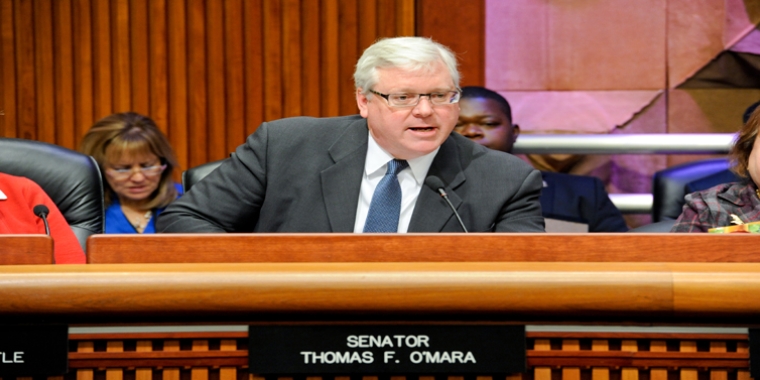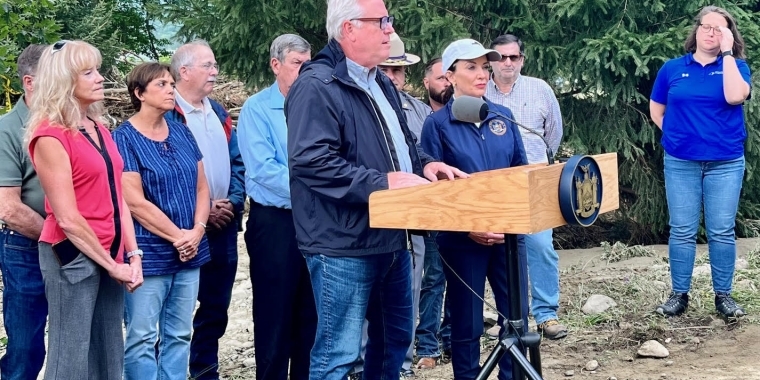
O’Mara: Senate budget stays focused on tax cuts, jobs, infrastructure, heroin crisis

Senator O'Mara at a legislative budget hearing earlier this session.
Albany, N.Y., March 14—State Senator Tom O’Mara (R-C, Big Flats) said that the Senate’s one-house Budget Resolution approved late today includes a broad-based tax cut plan targeted for key economic sectors including agriculture and small businesses, additional funding for local schools and infrastructure, and enhanced support to expand the state’s prevention, recovery and treatment services for heroin and opioid addiction.
“The core proposals underpinning the Senate budget take steps to keep getting state and local taxpayers out from under America’s highest tax burden. Our budget renews and revitalizes New York’s commitment to local job growth, local tax relief, local environments, local infrastructure, and local community safety and development,” said O’Mara. “It also strengthens New York State’s commitment to education, prevention, recovery and treatment services to help us better address the heroin crisis.”
This week’s passage of the respective Senate and Assembly 2016-17 Budget Resolutions will set the table for meetings of the Legislature’s joint budget conference committees and negotiations with Governor Andrew Cuomo on a final 2016-17 state budget by the start of New York’s next fiscal year on April 1. These one-house budgets largely serve as public statements of the priorities each legislative chamber will be staking out during the upcoming budget talks.
O’Mara, a member of the Senate Task Force on Heroin and Opioid Addiction, said the Senate budget includes $167 million to continue to enhance the state’s heroin and opioid addiction prevention, treatment, recovery, and education services. He said the budget reflects input he and his colleagues have received at numerous local public forums they’ve conducted since 2014, including one recently in Penn Yan (Yates County).
O’Mara, the chairman of the Senate Environmental Conservation Committee, said that the Senate budget also agrees with the Assembly and Governor Cuomo to fully fund New York’s Environmental Protection Fund (EPF) at $300 million, a move that’s been sought by the state’s leading conservation groups. The EPF supports critical local environmental initiatives including clean air and water projects that help create local jobs. O’Mara said that studies have shown that for every dollar of EPF funds invested in land and water protection, the state and localities get back seven dollars in economic benefits. The Senate budget also includes an additional $200 million for the “Water Quality Infrastructure Improvement Grant Program” to assist localities with undertaking drinking and wastewater infrastructure projects. Additionally, the Senate budget increases EPF to fight invasive species, including establishing a $4-million matching grant fund for municipalities and lake owners’ associations to treat aquatic invasive species such as Eurasian Milfoil, as well as $275 million for dredging projects.
Late last week O’Mara and his colleagues announced that the Senate’s budget plan advances a broad-based, $3.5-billion tax cut plan aimed at middle class taxpayers, senior citizens, small businesses and farmers. The plan includes a new “Middle Class Income Tax Relief Program” that will enact a 25-percent rate reduction for middle class taxpayers to bring middle class tax rates to their lowest level in 70 years. It also proposes new income tax relief to produce tax savings for New York’s senior citizens and to try to help stop the exodus of retirees from New York. The proposed tax cut would provide the first increase to the exempt amount of private pensions and retirement income since 1981, saving hundreds of thousands of seniors approximately $275 million annually when fully phased in. The plan also expands Personal Income Tax Exemptions (PIT) for small businesses and farms, as well as important estate tax reform. Additionally, the Senate wants to eliminate, this year, the higher 18-a utility surcharge first imposed on New Yorkers in 2009, a state-imposed cost that hits farmers, manufacturers and senior citizens facing high energy expenses especially hard.
O’Mara, noting that the Senate budget stays within a self-imposed two-percent spending cap and protects state taxpayers over the long run by proposing a Constitutional amendment that would require a two-thirds majority vote for the approval of any new tax increases in the future, said that other highlights of the Senate budget include:
> an overall increase of $1.655 billion in state aid to public schools, an increase of 7.15 percent, including the complete elimination of the damaging and highly controversial Gap Elimination Adjustment (GEA) that has cost school districts locally and statewide billions of dollars in state aid over the past several years, as well an $880-million increase in Foundation Aid.
“The elimination of the unfair and detrimental Gap Elimination Adjustment is a top priority for our local school districts, and it will be a top priority for Senate Republicans throughout this year’s budget negotiations. It’s a priority I strongly share. It’s time to completely eliminate the GEA,” said O’Mara. The GEA was originally enacted in 2009-2010 by then-Governor David Paterson, and when both houses of the Legislature were under Democratic control, as a way to help the state close a multi-billion-dollar budget gap. Republicans in the Senate at that time unanimously rejected the move as a budget-balancing scheme that would hurt local school districts;
> parity in funding between the five-year state Department of Transportation (DOT) and Metropolitan Transportation Authority (MTA) capital plans. Under Cuomo’s proposed budget, the DOT capital program was slated to receive approximately $22.1 billion while the MTA would have received roughly $26 billion – a disparity in funding that O’Mara and many other, especially upstate, legislators strongly opposed.
The Senate budget also directs a series of additional funding increases for the Consolidated Highway Improvement Program (CHIPS) for localities. The Senate budget redirects a portion of the governor’s proposed $1-billion PAVE NY program for local roads, and $1-billion BRIDGE NY program for bridges, so that $500 million from each program will go to local roads and bridges through the existing CHIPS funding distribution formula. The Senate also carves out an additional $40 million for CHIPS from Cuomo’s proposed “Extreme Weather Infrastructure Hardening Program,” which he has proposed to fund at $500 million.
Last week O’Mara and Assemblyman Phil Palmesano (R,C,I-Corning) organized a bipartisan group of 130 senators and members of the Assembly who joined county and town highway superintendents and other local leaders from throughout the state to call for increased support for local roads and bridges. They noted that local roads and bridges account for 87% of the roads, 52% of the bridges, and 48% of the vehicle mileage logged in New York State.
> additional provisions of the Senate’s “Grown in New York” plan, which O’Mara cosponsors, a comprehensive legislative program blending tax and regulatory reform incentives, low-interest loans and grants, an expanded student loan forgiveness program and other initiatives to help existing farmers stay on the land and encourage more young men and women to consider careers in agriculture. This year’s Senate budget, for example, would establish a college loan forgiveness program for ag educators.
O’Mara, a member of the Senate Agriculture Committee, said that it’s especially important that the Senate budget restores more than $11 million in agricultural program funding cuts proposed by Cuomo impacting nearly 50 different programs, the largest single reduction in agriculture programs in five years. Since 2011, O’Mara and his colleagues have initiated budget restorations and funding for new programs totaling more than $32 million. Among other programs and institutions, the governor this year has proposed to cut or eliminate funding for the Wine and Grape Foundation, Future Farmers of America, Tractor Rollover Prevention, Farm Net (Farm Family Assistance), Integrated Pest Management, and the Cornell Diagnostic Lab along with other vital Cornell research and study programs invaluable to the dairy industry among other critical agricultural challenges including food safety research and study, disease detection and prevention, honeybee die-off, invasive species, pesticide use, and rabies prevention and treatment.
O’Mara added that the Senate budget includes $200,000 for an innovative proposal by Cornell’s Small Farms Program that the Senate proposed earlier this year to help establish up to five veteran-owned small farms through a first-in-the-nation pilot program. Returning veterans and those seeking a career change could be encouraged to try agriculture, utilizing benefits they’ve earned under the GI Bill to gain training and expertise to begin their own successful small business. In turn, these sites would be available to train additional veteran-farmers in future years.;
> denies the governor’s proposal to include $27 million to enact the DREAM Act to allow illegal, undocumented immigrants to apply for state college tuition assistance
The Legislature will soon convene public conference committees to settle legislative differences on this year’s budget and reach agreements with Cuomo on a final budget. The upcoming conference committees can be watched live on the following Senate website: http://www.nysenate.gov/events



